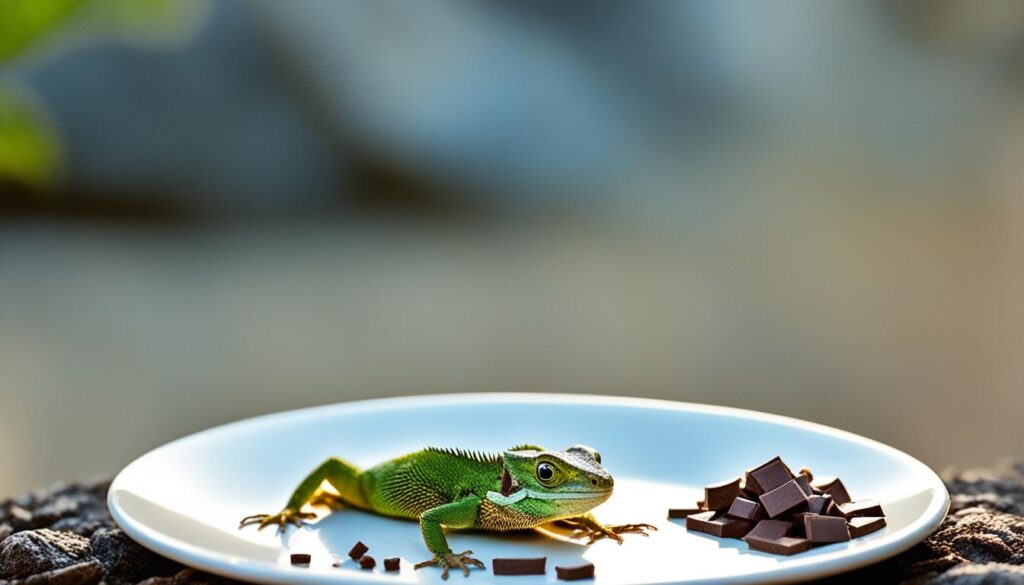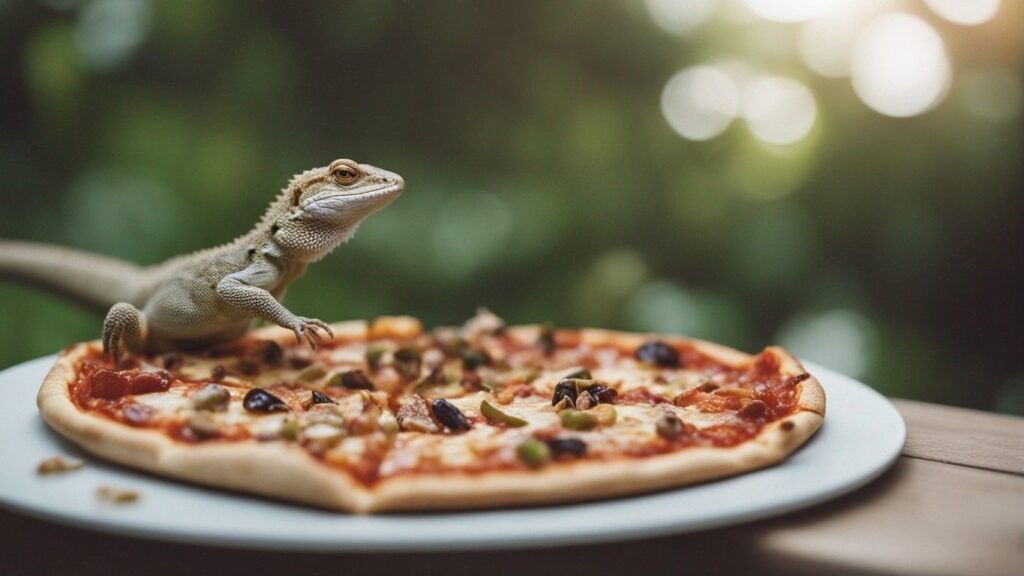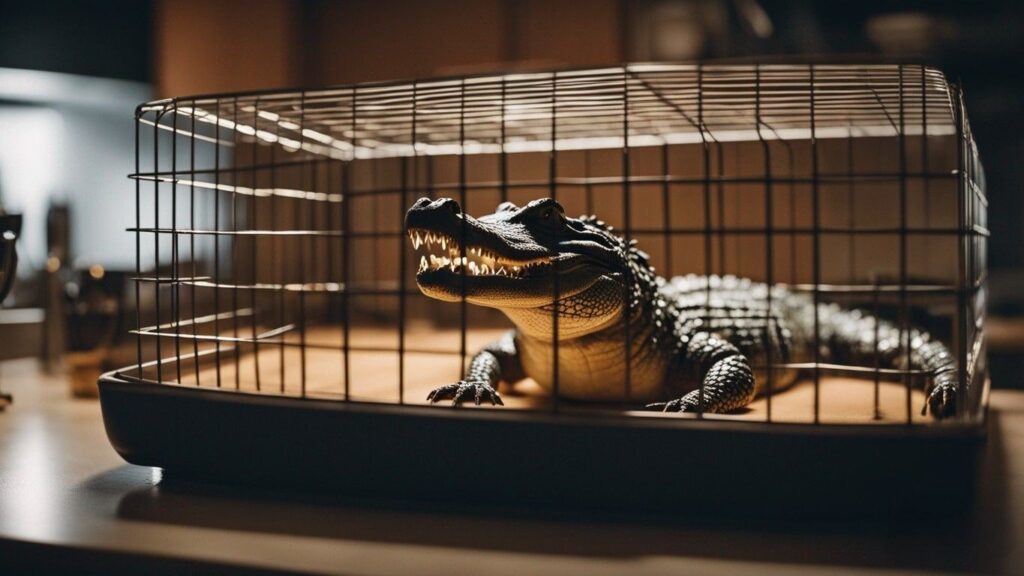Did you know that chocolate, a beloved treat for humans, can be extremely harmful to certain creatures?
In fact, chocolate can have a devastating impact on lizards. Despite their ability to consume a wide variety of insects and plants, lizards should never be fed chocolate. This seemingly innocent treat contains a compound called theobromine, which is toxic to reptiles and can lead to serious health complications.
Lizards have slower metabolisms compared to humans, which means they are unable to effectively digest the chemicals found in chocolate.
The consumption of chocolate can result in a range of issues for these reptiles, including vomiting, diarrhea, seizures, and even death.
In this article, we will delve into the dangers of feeding chocolate to lizards and explore their dietary needs in detail.
Discover why chocolate is ill-suited for lizards and learn safe dietary practices for the well-being of your scaly friends.
Key Takeaways:
- Chocolate is toxic to lizards due to the presence of theobromine.
- Theobromine can cause vomiting, diarrhea, seizures, and even death in lizards.
- Lizards have slower metabolisms and cannot effectively digest chocolate.
- Lizards require a balanced diet of insects, fruits, and vegetables to thrive.
- Safe dietary practices involve avoiding feeding lizards chocolate and other harmful foods.
Understanding Lizards’ Dietary Needs
Lizards have specific dietary needs that must be met to ensure their health and well-being.
It is crucial for lizard owners to understand the natural diet of lizards and their nutritional requirements.
Natural Diet of Lizards
Lizards primarily have a natural diet consisting of insects. These may include crickets, mealworms, and roaches.
However, some lizards also consume fruits and vegetables as part of their diet.
Nutritional Requirements of Lizards
For lizards to thrive, they require a balanced combination of proteins, vitamins, and minerals.
These essential nutrients play a crucial role in supporting their overall health and physiological functions.
Understanding the specific nutritional requirements of different lizard species is essential.
Different species may have varying dietary needs, and it’s important to provide them with appropriate care accordingly.
The Dangers of Chocolate for Lizards
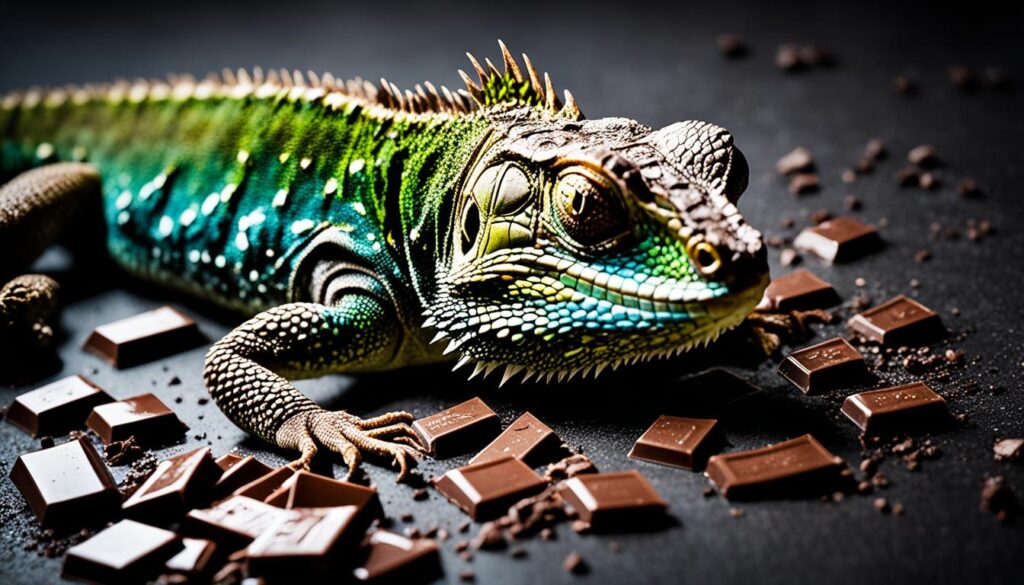
When it comes to chocolate, lizards are at risk of encountering serious health dangers. This delectable treat, beloved by humans, contains toxic ingredients that can have adverse effects on reptiles.
It is crucial for lizard owners to understand the potential risks so that they can keep their pets safe and healthy.
Toxic Ingredients in Chocolate
Chocolate contains two main toxic ingredients: theobromine and caffeine. These substances can have detrimental effects on the central nervous system and cardiovascular system of lizards.
Theobromine, in particular, poses a significant threat, as lizards have difficulty metabolizing it due to their slower metabolic rates.
As a result, theobromine can accumulate in their bodies, leading to various health issues.
Health Risks Associated with Chocolate Consumption
Even small amounts of chocolate can have severe health consequences for lizards. Consuming chocolate can cause an increased heart rate, tremors, seizures, vomiting, and, in severe cases, even death.
Due to their unique physiology, lizards are highly susceptible to the toxic effects of chocolate, making it essential to prevent them from accessing it.
To protect your lizard from these health risks, it is crucial to be aware of the dangers and take appropriate precautions.
Keep chocolate and any other foods containing toxic ingredients out of their reach to avoid accidental ingestion.
Seek veterinary assistance immediately if you suspect your lizard has consumed chocolate, as prompt intervention can be crucial in mitigating the effects and ensuring their well-being.
Why Chocolate Is Not Suitable for Lizards
Lizards have slower metabolisms than humans, which means they cannot effectively process and eliminate the chemicals in chocolate.
Theobromine and other compounds present in chocolate can stay in a lizard’s body for longer periods, posing a higher risk of toxicity.
Feeding chocolate to lizards is not suitable and should be avoided for several reasons:
Metabolism and Digestive System of Lizards
Lizards have unique metabolic processes and digestive systems that differ from those of humans.
Due to their slower metabolism, lizards are unable to efficiently break down and eliminate the substances found in chocolate.
Theobromine, in particular, can have detrimental effects on a lizard’s health. This compound can remain in their system for an extended period, leading to an increased risk of toxicity.
The slower digestion and elimination of chocolate by lizards can result in severe health issues and even death.
Lack of Nutritional Benefits
Chocolate does not provide any nutritional benefits to lizards. It is not a natural part of their diet and does not contain the essential nutrients, proteins, vitamins, or minerals required for their health and well-being.
Feeding chocolate to lizards can lead to imbalances in their diet, leading to deficiencies and other health problems over time.
Considering the slower metabolism and digestive system of lizards, as well as the lack of nutritional benefits, it is crucial for lizard owners to refrain from feeding their pets chocolate.
Providing a proper and balanced diet that meets their specific dietary requirements is essential for the overall health and longevity of these fascinating reptiles.
Safe Dietary Practices for Lizard Owners
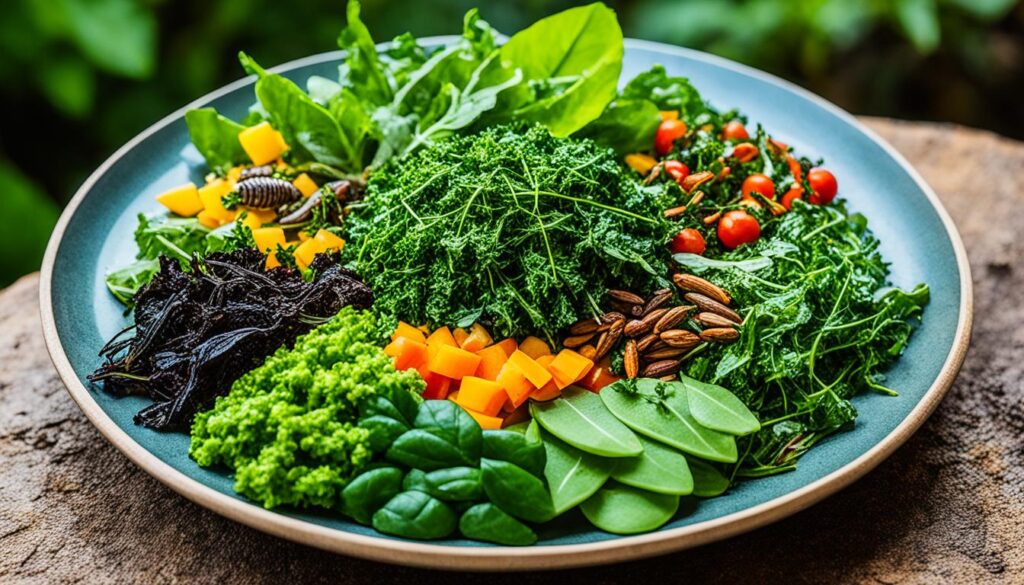
To ensure the health and well-being of lizards, it is important for lizard owners to practice safe dietary practices.
Providing a balanced and appropriate diet is crucial for the overall health and longevity of your pet reptile.
By understanding the recommended foods for lizards and the foods to avoid, you can ensure that your lizard receives the necessary nutrients without any potential risks.
Recommended Foods for Lizards
When it comes to feeding your lizard, a diet consisting of a variety of insects, fruits, and vegetables is highly recommended.
These foods provide essential nutrients and vitamins that contribute to the overall well-being of your pet.
Here are some of the recommended foods for lizards:
- Insects: Crickets, mealworms, and roaches are excellent sources of protein for lizards. These insects are readily available and can be easily purchased from pet stores.
. - Fruits: Offer your lizard a selection of fruits such as berries, melons, and apples. These fruits are packed with vitamins and provide a tasty treat for your pet.
. - Vegetables: Incorporate leafy greens like kale, collard greens, and spinach into your lizard’s diet. Additionally, carrots and bell peppers can provide a good source of vitamins and minerals.
Foods to Avoid Feeding Your Lizard
While it is essential to know what foods are beneficial for your lizard, it is equally important to avoid feeding them foods that can be toxic or harmful.
Some foods that should be avoided when feeding your lizard include:
- Chocolate: As discussed earlier, chocolate contains theobromine, which is toxic to lizards. Never offer chocolate or any chocolate-based products to your lizard under any circumstances.
. - Caffeine: Similar to chocolate, caffeine can be harmful to lizards. Avoid giving your pet any caffeinated beverages or foods containing caffeine.
. - Onions and Garlic: These foods can cause digestive issues and even lead to anemia in lizards. Keep them away from your pet’s diet.
. - Citrus Fruits: Citrus fruits, such as oranges and lemons, can cause digestive irritation in lizards. It is best to avoid feeding them these fruits.
By following these safe dietary practices, you can provide your lizard with a nutritionally balanced diet that supports their health and overall well-being.
Remember, the key to keeping your lizard healthy is to provide them with a diet that closely mimics their natural dietary habits in the wild.
What to Do If Your Lizard Eats Chocolate
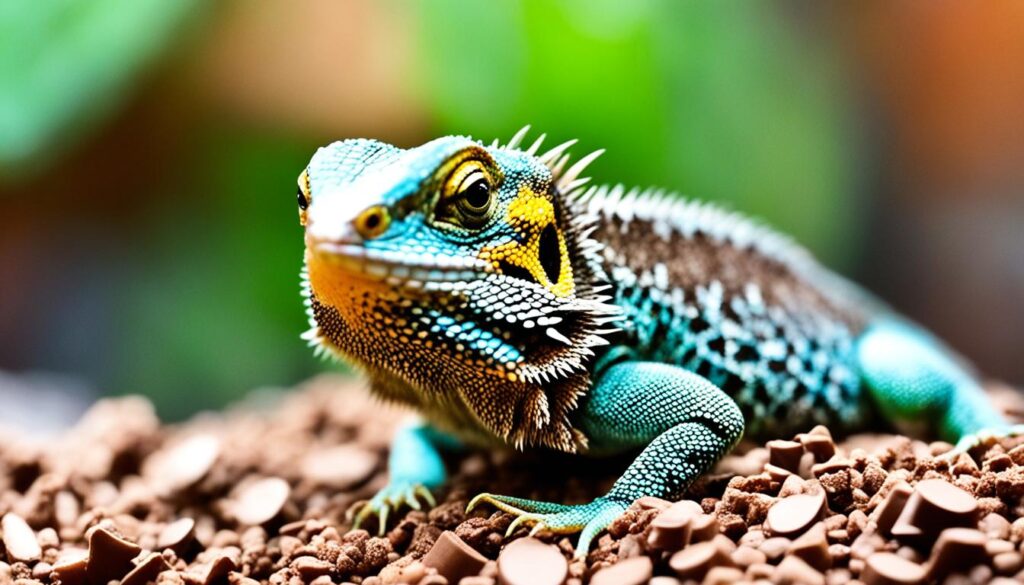
If a lizard accidentally eats chocolate, it is important to take immediate steps and seek treatment.
Immediate Steps and Treatment
The first step is to contact a veterinarian for guidance and advice on the necessary steps to address potential toxicity.
The veterinarian may recommend inducing vomiting or providing supportive care to mitigate the effects of theobromine.
Preventing Accidental Ingestion
To prevent accidental ingestion of chocolate, lizard owners should ensure that chocolate and other harmful foods are kept out of their pet’s reach and provide a safe environment.
Conclusion
In conclusion, it is important to understand that lizards should not eat chocolate. Theobromine, a compound found in chocolate, is toxic to lizards and can lead to various health issues, including vomiting, diarrhea, seizures, and even death.
Due to their slower metabolisms, lizards cannot effectively digest the chemicals in chocolate, which poses an increased risk of toxicity.
Lizards have specific dietary needs that should be met to ensure their health and well-being.
A balanced diet of insects, fruits, and vegetables is essential to provide the necessary proteins, vitamins, and minerals for their proper development.
By following safe dietary practices and preventive measures, lizard owners can prioritize their pet’s health and longevity.
To maintain the well-being of lizards, it is crucial to avoid feeding them harmful foods, such as chocolate, caffeine, onions, garlic, and citrus fruits.
Lizard owners should also ensure that chocolate and other toxic substances are kept out of their pet’s reach to prevent accidental ingestion.
By providing a safe environment and appropriate care, lizard owners can promote the overall health and happiness of their beloved pets.
Frequently Asked Questions
Q: Can lizards eat chocolate powder?
A: No, lizards cannot eat chocolate powder. Chocolate contains theobromine, which is toxic to many animals, including lizards.
Q: Can lizards eat chocolate chips?
A: No, lizards should not eat chocolate chips or any form of chocolate. The theobromine in chocolate is harmful to them and can lead to serious health issues.
Q: Can lizards eat white chocolate?
A: While white chocolate contains lower levels of theobromine, it is still not recommended for lizards. White chocolate is high in sugars and fats, which are not suitable for a lizard’s diet.
Q: Can lizards eat any human food?
A: Lizards can eat some human foods, such as fruits and vegetables, but these should be given in moderation and properly prepared. Foods high in sugars, fats, and artificial ingredients should be avoided.
Q: Can lizards eat bread?
A: Lizards should not eat bread. Bread offers no nutritional value to lizards and can lead to digestive issues due to its yeast and gluten content.
Q: Can lizards eat rice?
A: It’s not recommended to feed lizards rice. Rice can be difficult for lizards to digest and does not meet their nutritional needs.


